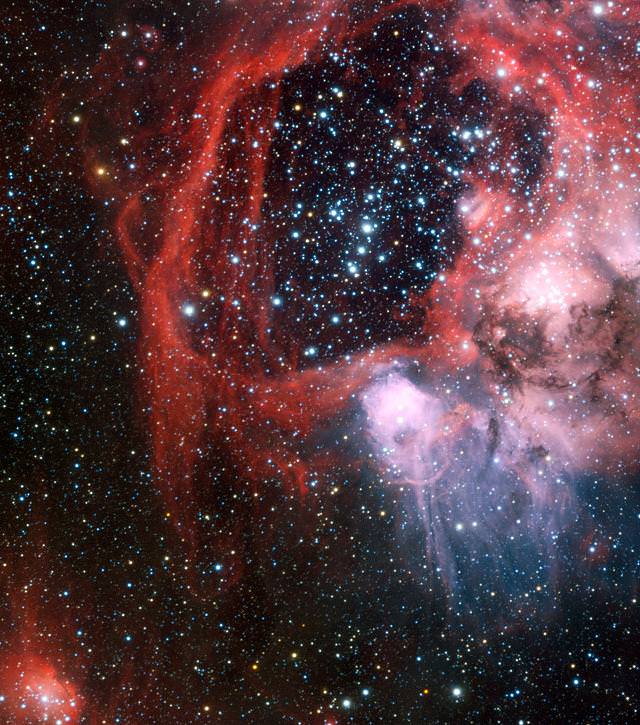[/caption]
Thanks to ESO’s Hidden Treasures 2010 astrophotography competition, Manu Mejias, from Argentina compiled the data to give us a view of a cosmic superbubble that staggers the imagination with its size. Spanning around around 325 by 250 light-years across, we’d never realize the true nature of this phenomenon if it wasn’t so far away.
Officially designated as LHA 120–N 44, this sprawling complex of hot gases makes its home in the Large Magellanic Cloud. Skirting its edge is young star cluster, NGC 1929, whose intense ultra-violet radiation paints the visible portrait of stellar winds in action. To give you a good idea of just how big this super-bubble really is, take a look at this awesome map from Atlas Of The Universe.

Can you conceive of a nebula so large that it stretched from Cassiopeia to Vela in one direction and far further than Ursa Major to Phoenix in the other? Like a bracelet around the arm of the Milky Way, it would be so huge we probably wouldn’t even be aware it was there. Now that’s a super superbubble!
Picture a soapy mixture being stretched to the breaking point… the massive stars embedded in the nearby clusters going supernova – creating shockwaves and expelled gases. Like the child blowing the bubble, the stellar winds continued to expel, clearing the center of material. At the perimeters, new stars are continuing to form where the gases are compressed. It’s the nature of the beast… cosmic recycling in action.
Many thanks go to Manu Mejias for taking a look at a really BIG picture!
Original Story Source: ESO Photo Release. And thanks to Richard Powell of Atlas Of The Universe.


Yo Tammy, referring to the first image caption where it states: “Lying within the Large Magellanic Cloud, a satellite galaxy of our own Milky Way,…”; that should be the definite article “the”, not “our own”, since there is only one Milky Way galaxy – unless you know of some others by that name?
geez… now i’m even taking the grammatical rap for ESO’s captions! giggle…
i fixed it. 😀
Don’t worry, Tammy, I’ve sent a note to Douglas Pierce-Price, the
ESO Public Information Officer, and I got a reply from him – no, it was not a rude reply!
Actually there are millions of milky ways (Greek: ????????), but only one is refered to as The Milky Way (????????).
In the original language, milky way and galaxy is the same word.
http://en.wikipedia.org/wiki/Milky_Way
Refer to chapter 7.1